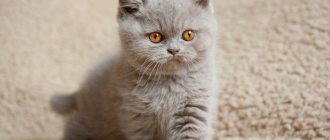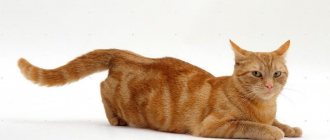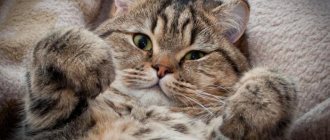4378Pavel
Before you ask yourself the question “how to choose a kitten?”, you must be sure that you have enough time, effort and money to care for your new pet. You need to understand that babies are very playful. They will try to play with the curtains, they will curiously explore the shelves and cabinets in your house, and also do many other things that you will not be happy with. However, if all this does not bother you, you are confident that you can properly care for a kitten, and have decided to get such a pet, then our article is for you.
It is very important to make the right choice, because for many people, pets become full-fledged family members and friends. We will tell you about the main points when choosing a pet, which you need to pay attention to first of all, so that the kitten you choose fully meets all your expectations.
© shutterstock
Why do you need a cat in the house?
It would seem that all that remains is to decide on the breed of the tailed pet, but not everything is so simple. Of course, it is necessary to take into account the characteristics of a particular species, but there are also equally significant points. By purchasing and bringing a kitten into the home, the owner takes full responsibility for its well-being, health and, ultimately, fate. Cats are proud and freedom-loving animals; you will have to share not only your home space with them, but also give them enough attention and care.
If the potential owner is faced with the goal of finding a four-legged friend, then in this case you only need to know how to choose a healthy kitten. However, if the future owner is faced with a completely different task, for example, pursuing the commercial goal of breeding a specific breed, or he wants to choose a kitten for the home, or give his little one a birthday present, then the issue of choice should be approached more thoroughly.
Where is the best place to buy a kitten?
After you decide to choose a kitten and decide on the breed, you need to decide where to buy the animal. There are several options here :
- You can pick up a kitten on the street. On the one hand, this is a good thing: you will most likely save the life of such an animal, and the baby will have a home. On the other hand, if you adopt a kitten from the street, you must understand that there is absolutely no guarantee that it is healthy. With a 99% chance, you will need to at least remove fleas and worms. In addition, there is a possibility of encountering more serious diseases. Simply put, when picking up a kitten on the street, you must be prepared for its treatment and a longer period of adaptation to life in the house;
- You can buy a kitten second hand. You may think that with such a kitten there will be much fewer problems than with a street one. No matter how it is! Many sellers are dishonest and can deceive you. This is especially true for purebred kittens. It is quite possible that instead of a purebred animal, they will slip you an ordinary one. Of course, such a kitten is no worse than a purebred one, but paying money for one thing and actually getting something else is unpleasant;
- Pet stores also do not guarantee that the kitten you purchase will be purebred and healthy. It is best to take your baby to pet stores that value their reputation. You can read reviews about certain stores on the Internet or consult with friends;
- A good option would be to adopt a kitten from trusted acquaintances or friends. In this case, the chance of being deceived tends to be minimal. In addition, you can save a lot of money and at the same time help your friends: as a rule, finding owners for kittens (especially if they are not purebred) is quite difficult, so their owners will only be happy if they manage to find an owner for one or more babies;
- if you need a purebred kitten, a good option would be to choose a kitten at a show. There you can see many different purebred cats in person, chat with their owners and learn more about animal behavior. Breeders will help you choose the right pet and tell you about all the features of your chosen breed;
- The best option would be to choose a kitten in a special nursery. Typically, such establishments monitor the health of animals well, and cats with hereditary diseases are not used for breeding kittens.
© shutterstock
What gender is the little pet?
The first point, which is predetermining for many people, is the gender of the kitten. Females and males differ from each other from early childhood not only in external sexual characteristics. As a rule, the individual behavioral characteristics of pets largely depend on gender. They say that cats are more inclined to loyal friendship with their owner than naughty cats, which, in turn, are famous for their capricious and changeable disposition. Perhaps this is just a stereotype. How an animal will behave at home largely depends on the upbringing it received from the first months of life.
Before choosing a kitten from the litter, you can independently determine whether it is a boy or a girl. In one-month-old babies, external sexual characteristics are not clearly expressed, so the characteristic feature by which one can navigate is the distance between the anus and the urinary tract. In cats it is insignificant; in small cats it reaches 2 cm.
Which kitten should you prefer?
You can choose a purebred or an ordinary baby, depending on personal preferences.
Let's look at the pros and cons of different choices.
Pedigree kittens:
- Well socialized, not afraid of people, accustomed to handling. As a rule, breeders constantly communicate and have contact with cats, and the litter brought in is under human supervision from the first days, which has a positive effect on the further interaction of animals with people.
- Conscientious breeders monitor the health of cats before breeding, which has a positive effect on the offspring. If an adult animal is diagnosed with a congenital disease or a disease transmitted by inheritance, then such an animal is excluded from mating.
- Cats are attractive and unusual, depending on the breed, which you can choose by studying its characteristics. Before purchasing an animal of any breed, you must make sure that members of your household are not allergic. Unfortunately, children are susceptible to allergies not only to cats with hair, but also to cats with skin without hair.
- It is necessary to study the characteristic behavior of cats of the chosen breed so that climbing on curtains or jumping on the owner from the height of the closet is not a surprise.
- The presence of hereditary breed diseases in kittens due to the dishonesty of people offering them for purchase. As a rule, such animals are sold in markets.
- The breed's tendency to be allergic to food or other external factors.
Regular kittens:
- have strong immunity;
- have a hunting instinct, useful in the fight against rodents;
- adapted to live both in an apartment and in a private house.
How to find your four-legged friend among others?
It often happens that in a litter of several kittens, one will purposefully approach a person. This is probably his kitten. If the baby instinctively showed interest in his future owner, his choice probably should not be neglected. He will become a devoted, loyal friend and an obedient pet.
An interesting detail that can tell you how to choose the right kitten is also the behavior of babies in a common flock. It all depends on the potential owner’s ideas about what a cat should be like at home. If you need a nimble, playful baby with leadership abilities, then you need to pay attention to this one. If you have a different picture in your imagination, for example, warm family gatherings in the evening with an affectionate cat in your arms, then you need to take a closer look at the calm, friendly baby.
What should you pay attention to when buying a kitten? How to choose the right kitten?
First of all, you need to decide why you are buying a kitten, do you just want to get a pet or are you making plans for a stellar career for your future pet, wanting to perform and win competitions at professional exhibitions, or maybe you want to start breeding?
If you want to buy a purebred cat, then first of all you need to choose the very breed that you like the most. Different breeds of cats distinguish these animals not only by their appearance, but even by the characteristics of their characters and temperaments. There are also differences in the care and maintenance of different breeds. In this article we will not focus on all varieties of cat breeds; you can find out more detailed information in our “Breed Catalog”.
At what age is it better to buy a cat?
The ideal age for kittens to be weaned from their mother and moved to different homes is considered to be 2-3 months. There are enough advantages of this particular age:
- Firstly, kittens can feed themselves.
- Secondly, they have become quite independent, able to take care of their “cat” hygiene.
- Thirdly, kittens are mobile, active and willing to learn.
It is also important to know how to choose a healthy kitten. Of course, no one is immune from further problems with the pet’s health (viral diseases, infections and other ailments), but you can determine that the baby is currently completely healthy by the following signs:
- the kitten has a wonderful appetite;
- the entire set of baby snow-white teeth is present;
- the coat is shiny and silky;
- the kitten’s ears should not have any discharge (otherwise it is most likely a sign of ear mites);
- there are no wounds on his body;
- There are no fleas on the kitten's neck and chin.
A weakened kitten that is clearly not gaining weight, looks lethargic, and is most likely infected with worms. You should definitely not self-medicate; it is better to immediately go with your new family member for a preventive examination. Perhaps the veterinarian will be able to objectively assess the kitten’s condition and prescribe the necessary vaccinations.
Features of cat breeds
One of the main features is the length of the coat. Persians have very long hair. Sphinxes don't have it at all. The remaining breeds are in an intermediate position. Remember that caring for long-haired pets requires a lot of money, time and effort. On the other hand, cats without hair also need comfortable conditions so that they do not freeze or overheat.
Other features of cat breeds relate to the structure of the body. Various extreme symptoms usually have a bad effect on the health of the animal.
Breeds differ in temperament. Very kind cats are ragdolls, this feature is even included in their breed standard. Much is influenced by the correct upbringing and disposition of the cat owner.
https://youtu.be/J6vy_rjom_A
You can also take a mongrel cat. Or, for example, a half-Persian. However, the main advantage of a purebred cat is that you really know who you are taking into your home.
How to decide on the breed?
The next determining factor, which plays a huge role in choosing a pet for your home, is its breed, especially if the cat is expected to participate in various exhibitions and competitions. By the way, having settled on a specific cat breed, you must:
- study the behavioral characteristics of its representatives;
- visit exhibitions;
- read reviews from more experienced breeders regarding its maintenance and care.
For example, the well-known Siamese cats are much more likely to develop genetic diseases than any other representatives of the feline family. Or, purposefully not wanting to have a long-haired cat, many choose the hairless Sphynx, without even realizing how much more difficult it is to care for it compared to other breeds.
Features of purebred cats
It is also necessary to take into account the fact that animal breeds bred by artificial selection through the genetic sophistication of scientists have by nature weaker immunity. Much less of these pets are endangered by an animal “without clan or tribe” that has undergone natural selection.
Many of the artificially bred breeds are not able to take care of themselves. A striking example is Persian cats, which cannot look attractive without a person. Their fluffy coat requires regular bathing, brushing and other activities, but cat licking is not enough. And in the psychological aspect, such animals are maximally dependent on the owner.
Meanwhile, there are many breeds that are characterized by the hunter's instinct. In addition to the desire to earn their living, they, as a rule, have naturally excellent physical characteristics. Among the natural born hunter cats are:
- Norwegian forest;
- Maine Coons;
- bobtails.
Limited apartment space is not suitable for these predators. Private houses and a garden with many trees are where they can always frolic to their heart's content.
It is always necessary to remember that when choosing a kitten, the owner takes on a whole range of obligations and a mountain of responsibility. Animals are not toys or an addition to the home interior. Cats of any breed trust and become attached to humans, the main thing is not to betray them.
Kitten care
Before purchasing, make sure you can handle raising a new family member. In addition to feeding, playing and grooming, you will have to take care of regular trips to the veterinarian.
What will your baby need?
To move to a new home you will need a carrier. You will also have to use it during trips to the veterinarian or other movements around the city. It is better to choose a house with a plastic bottom and for growth - it is quite possible that an older cat will go in it for sterilization/castration, routine examinations and even exhibitions.
Purchase two bowls in advance - for food and water. It is safer to buy ceramic or metal products, since they will not turn over or move, and they are easier to wash than plastic ones.
In addition to the tray and filler, be sure to take diapers. Be patient while your cat gets used to the litter box, and don't scold him if he makes mistakes.
You will also need to build a personal space. Choose a quiet corner and place a bed or soft house there. Remember that cubs are very active, so stock up on mice, “teasers” and balls. It is better to put wires and other rope-like things away so that the cat does not become interested in them.
To sharpen claws, it is better to choose 2 options: horizontal and vertical claws. You can only find out which of these your pet prefers after the fact.
Maintenance cost per month
Monthly expenses are individual, as it all depends on the preferred brands of food and the prestige of the chosen veterinary clinic.
For the first time, it will take about 4 thousand rubles to buy all the necessary things. This amount includes the carrier, bowls, tray, bed and scratching post. Every month you will have to buy food or natural products and a small package of filler. This will be approximately 1-2.5 thousand rubles per animal.
Sometimes costs may increase. This happens during planned visits to the veterinarian, sterilization and treatment of the disease. The pet must also be treated quarterly for worms. Pets that roam outside will need a flea collar.
Health of a new family member
Never bring animals home from the street until examined at a veterinary clinic. This is dangerous for other pets and even people. Only cats adopted from a cattery or acquired through good friends do not need a doctor.
Regardless of breed, do not forget about deworming and annual vaccination. Mestizos are no less vulnerable to infections, so compliance with the vaccination schedule is the direct responsibility of each owner.
Once you figure out how to choose a cat, making a decision becomes much easier. Based on your financial capabilities, availability of free time and preferences for appearance and character.
The article is for informational purposes only. Contact a specialist!
Signs of a healthy kitten
Signs of a healthy kitten are:
• activity, interaction with a person and with each other occurs without problems; • the coat is smooth and shiny, there are very few fleas or they are completely absent; • the ears are completely clean (both externally and internally), there is no rash on them, and they do not smell anything; • there is no discharge from the nose or eyes, the nose is slightly moist and pink in color, the eyes are transparent; • the oral cavity is pink, without injuries and signs of inflammation; • teeth without dirt; not crooked and white; • the baby's fur is not glued together due to diarrhea at the anus; • fatness, absence of swollen sides; • absence of respiratory system defects (hiccups, sneezing or coughing).
A kitten should be adopted at the age of two to two and a half months , and an adult animal at any age. The main thing is to get along with the new family member.
How to determine the character of your future pet?
Find out how long ago they ate before jumping to conclusions about a kitten's personality, as any living creature is likely to look sleepy after eating.
- See who is assertive, playful and friendly.
- Sit on the floor so the kitten (or kittens) can get used to you. How does he react? Is he scared or hissing? Ideally, the kitten should feel comfortable and not afraid.
- Play with the kittens. The kitten should show curiosity and touch the object with its paw.
- After playing, when the kitten has calmed down, try to gently pick him up. Although kittens generally don't like to sit still, a kitten should be neutral about being held. An animal that has not had close contact with people will do everything in its power to wriggle out of your grasp.
Kitten or adult
As a rule, everyone wants to buy a small, fluffy and cute kitten, but you definitely won’t be able to remove its energy when you want. He will explore and climb absolutely everything and everywhere.
Adult cats are smarter, and their temperament is already somewhat reduced. They don't need as much attention as kittens require.
The main reason why people take small kittens is fear that the adult may have bad habits. It is believed that it is easier to raise a baby, although an adult cat will understand much better what is wanted from it.
Different prices for kittens: main reasons
Pet class kittens are the cheapest. The higher the category, the higher the price tag will be. The first thing included in the price is the breeder's expenses. He needs a good pair that will produce healthy offspring, the cost of which is at least 120 thousand rubles.
Next, you need to feed the kittens, provide them with proper care, prepare documents for the pedigree, and get vaccinations. You need to recoup the costs within 3-5 years, because this is the maximum period during which it is recommended to obtain offspring from a cat. It is also prohibited to allow more than 2-3 litters per year, because the animal’s body must recover after childbirth and lactation.
The price is also influenced by the nursery's reputation, class, and pedigree. People line up for popular breeders, and he can decide what price to set. The cost is often influenced by the rarity of the color or the structural features of certain parts of the body. For example, a fold-eared kitten costs more than a straight-eared one.











